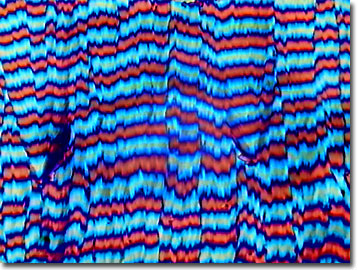Polarized Light Digital Image Gallery
Dopamine (Dopastat)
As one of the neurotransmitters playing a major role in drug addictions, dopamine is a chemical messenger similar to adrenaline. Dopamine affects a variety of brain processes, many of which control emotional responses, movements, and the experiences of pain and pleasure.

View a second image of dopamine.
Dopamine is a naturally occurring immediate precursor of norepinephrine, and also a synthesized organic compound that is used to correct hemodynamic imbalances due to shock, trauma, and renal failure. The drug causes an increase in cardiac output and vasoconstriction in blood vessels, and when low doses are administered, causes renal and mesenteric vasodilatation. Side effects include nausea, vomiting, headache, and anxiety.
Neurons that contain dopamine are clustered in the midbrain, and in Parkinson's disease, these nerve cells die. To alleviate some of their symptoms due to having virtually no dopamine, Parkinson's sufferers take a drug, L-DOPA, which is readily converted in the brain to dopamine. Some pharmaceuticals are considered dopamine agonists because they act by binding to dopamine receptors in place of dopamine and directly stimulate those receptors. In contrast, dopamine antagonists are chemical compounds that bind, but do not stimulate dopamine receptors. By keeping dopamine molecules from attaching to their receptors in the brain, these drugs prevent or reverse the actions of dopamine. Humans suffering from schizophrenia may have an overactive dopamine system and this class of pharmaceuticals offers a treatment. Mind-altering drugs, which are sometimes abused, can alter the dopamine function, but may vary in their specific actions depending on which dopamine receptors are stimulated or blocked. In addition, these drugs may act indirectly by changing the flow of neurotransmitters, such as dopamine. While behavioral and cardiac responses to amphetamine and cocaine are similar, due to increased levels of dopamine in the synapses, cocaine prevents dopamine reuptake while amphetamine helps increase the dopamine release rate.
Monoamine oxidase (MAO) is an enzyme that breaks down dopamine for recycling. Reserpine, a prescription drug, blocks the reuptake of dopamine and increases its exposure to lysis by MAO through restricting the storage of the biochemical in vesicles, resulting in much lower dopamine levels. Other pharmaceutical products, such as deprenyl, inhibit MAO enzyme action, resulting in increased dopamine concentrations and slower progression of Parkinson's disease.
Contributing Authors
Omar Alvarado, Thomas J. Fellers and Michael W. Davidson - National High Magnetic Field Laboratory, 1800 East Paul Dirac Dr., The Florida State University, Tallahassee, Florida, 32310.
BACK TO THE POLARIZED LIGHT IMAGE GALLERY
BACK TO THE DIGITAL IMAGE GALLERIES
Questions or comments? Send us an email.
© 1995-2025 by Michael W. Davidson and The Florida State University. All Rights Reserved. No images, graphics, software, scripts, or applets may be reproduced or used in any manner without permission from the copyright holders. Use of this website means you agree to all of the Legal Terms and Conditions set forth by the owners.
This website is maintained by our
Graphics & Web Programming Team
in collaboration with Optical Microscopy at the
National High Magnetic Field Laboratory.
Last Modification Friday, Nov 13, 2015 at 01:19 PM
Access Count Since September 17, 2002: 13460
Visit the website of our partner in introductory microscopy education:
|
|
